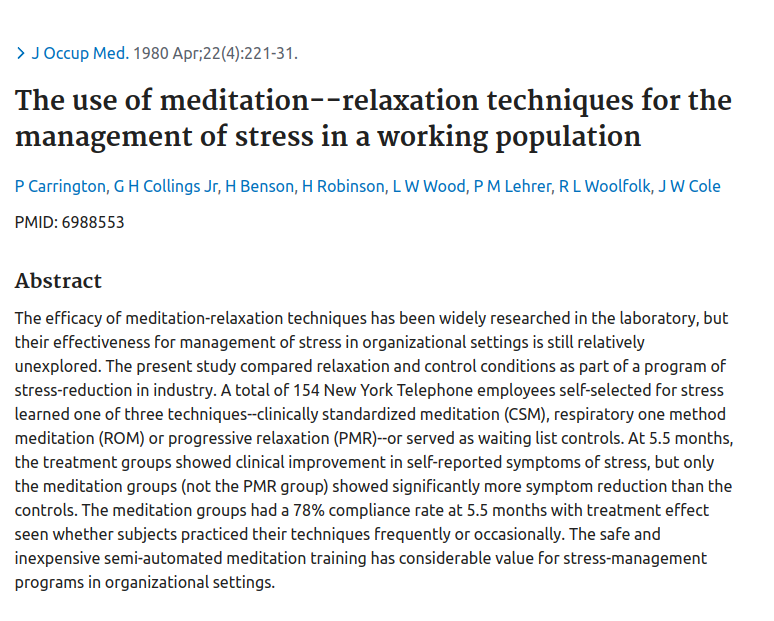The efficacy of meditation-relaxation techniques has been widely researched in the laboratory, but their effectiveness for management of stress in organizational settings is still relatively unexplored. The present study compared relaxation and control conditions as part of a program of stress-reduction in industry. A total of 154 New York Telephone employees self-selected for stress learned one of three techniques–clinically standardized meditation (CSM), respiratory one method meditation (ROM) or progressive relaxation (PMR)–or served as waiting list controls. At 5.5 months, the treatment groups showed clinical improvement in self-reported symptoms of stress, but only the meditation groups (not the PMR group) showed significantly more symptom reduction than the controls. The meditation groups had a 78% compliance rate at 5.5 months with treatment effect seen whether subjects practiced their techniques frequently or occasionally. The safe and inexpensive semi-automated meditation training has considerable value for stress-management programs in organizational settings.
The use of meditation--relaxation techniques for the management of stress in a working population
Publication
J Occup Med
22(4):221-31
Abstract
Web and Email Links
Related Listings
Journal
Journal of Human Stress
Human pupillary dilatation after topical instillation of phenylephrine was assessed in a prospective, randomized, controlled experiment to measure alterations in α-end-organ responsivity after regular elicitation of the relaxation response. Baseline pupillometric measurements were taken in both experimental and control subjects. The experimental subjects then practiced daily a technique that elicited the relaxation response while the control subjects sat quietly for comparable periods […]
Journal
NeuroReport
Previous research indicates that long-term meditation practice is associated with altered resting electroencephalogram patterns, suggestive of long lasting changes in brain activity. We hypothesized that meditation practice might also be associated with changes in the brain's physical structure. Magnetic resonance imaging was used to assess cortical thickness in 20 participants with extensive Insight meditation experience, which involves focused attention to internal experiences. Brai […]
Journal
Calmer
In light of World Sleep Day this month, this week’s guest post features Valerie Teh, Calmer’s Client Manager and Self-Care Practitioner, who shares her expertise on how to explore and embrace intelligent rest to enhance quality sleep and nurture your overall wellbeing.

